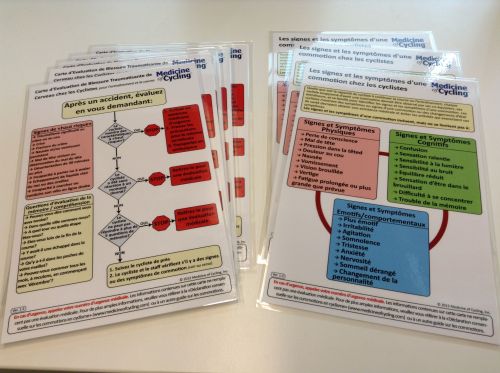By Wendy Booher
SAUSALITO, CA (BRAIN) — A non-profit organization is publishing a quick-reference card to help cycling teams and race officials assess possible concussions.
The group, Medicine of Cycling, has collaborated with a group of physicians and researchers with a special interest in cycling medicine to publish the laminated cards.
Cycling is the category leader for the number of estimated head injuries treated in U.S. hospital emergency rooms, with traumatic brain injury as the leading cause of death from sports-related injuries, according to the American Association of Neurological Surgeons.
Studies on the long-term impact of traumatic brain injury and concussion in cycling are rare, but evidence of the long-term effects of head injury in football (which is second to cycling in reported head injuries) has taken precedence through a publicized legal battle between the National Football League and 4,000 former players. Dementia and other neurodegenerative diseases are cited as long-term effects, as are abnormal brain wave activity, a wasting away of motor pathways, and symptoms similar to Parkinson's disease.
Concussion in cycling is often ignored, overlooked, or dismissed both because symptoms may not be immediately obvious and because taking a concussed racer out of competition costs him the race and all the advantages in its wake, such as stage wins, prize money, future endorsements, and racing contracts.
"Cyclists who sustain a fall and potential concussion have two options," explained Anna K. Abramson M.D., cofounder of Medicine of Cycling. "They can get back on the bike and 'wing it,' exposing not only themselves but those riding next to and behind them to further injury or, they can take a moment to check for abnormal reactions to normal physical processes."
In 2012 under the direction of Dr. Abramson, Jason Brayley M.D., and Steven Broglio Ph.D., MOC published its Concussions in Cycling Consensus Statement, which outlined detailed information for: actions to take during pre-season, race-in-progress concussion evaluation, post-race evaluation of a concussed athlete, and what to take into consideration before a concussed athlete may return to sport. The seven-page document has since become a document of reference for several top-level team physicians. However MOC believes that every medical professional involved in the sport of cycling should follow the guidelines published in the Concussion in Cycling Assessment Card.
"The card helps for a swift and targeted survey of potentially hazardous changes in the brain processing that signal a hard stop for returning to a high metabolic activity involving speed," Dr. Abramson said. "You don't have to be a neurologist or concussion specialist to get through the checklist and make a sensible call about the athlete's safety if you have a concussion assessment card in hand."
Ultimately, the guidelines set forth by MOC would become policy. USA Cycling has already taken the first step by providing coaches and officials with the card because, as Bill Kellick, USAC's director of communications, pointed out, "they are the 'first responders to an incident.'"
"We have also brought in a concussion specialist recommended by Dr. Abramson to our staff coaches meeting for more personal training, and have held a webinar for officials on concussion awareness," Kellick said.
The Concussion in Cycling Assessment Card is currently available in English, French, Hebrew, and Spanish, with Italian and Portuguese pending translation. The laminated card, as well as the Concussions in Cycling Consensus Statement, are available through MOC's website.


